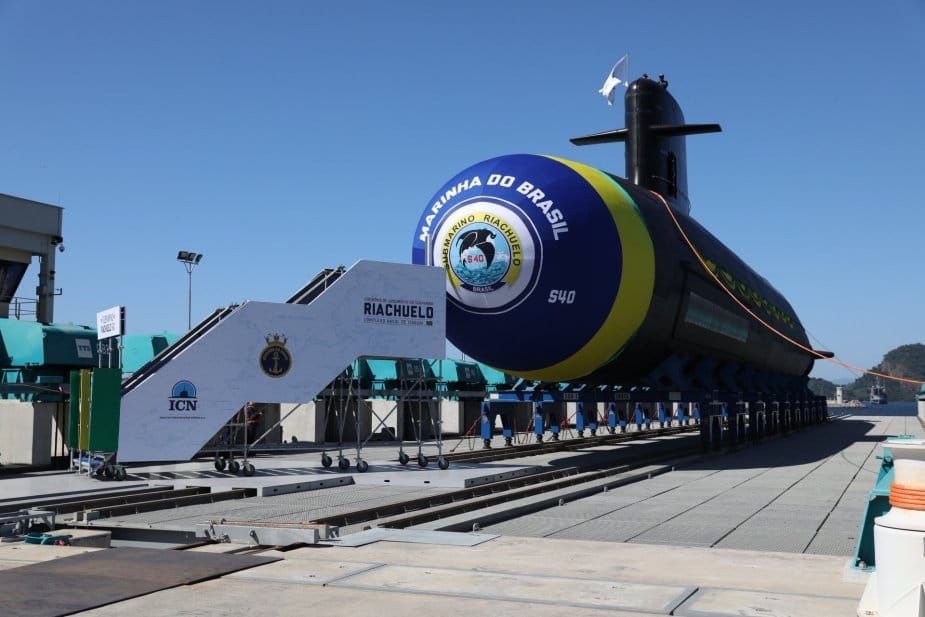Brazil wants special treatment for its nuclear submarine program—just like Australia
By Ian J. Stewart | June 28, 2022
 The Brazilian Navy’s first Scorpène-class submarine S40 Riachuelo, launched in December 2018. The first Brazilian nuclear-powered attack submarine SSN Alvaro Alberto is scheduled for 2030.
The Brazilian Navy’s first Scorpène-class submarine S40 Riachuelo, launched in December 2018. The first Brazilian nuclear-powered attack submarine SSN Alvaro Alberto is scheduled for 2030.
On June 6, Brazil and the IAEA entered into negotiations over safeguards (known as special procedures) to allow the largest South American country to use nuclear fuel in its slow-burning submarine program. Coming alongside a collective effort by the United States, the United Kingdom, and Australia (known as the AUKUS security framework) to transfer nuclear-powered submarines to Australia, this means that two non-nuclear weapons states are now negotiating with the IAEA over safeguards provisions for submarines. Although the two cases evolve within different security contexts, with AUKUS being squarely aimed at countering China, this new development will complicate the negotiations over how to safeguard nuclear material used in submarines.
Two sides of the same coin. The 2021 announcement about AUKUS focused attention for the first time in recent history on the question of how to safeguard nuclear fuel for submarines in a non-nuclear weapons state. Under AUKUS, the three countries are spending 18 months examining how to transfer nuclear submarines to Australia without undermining nonproliferation efforts. While much remains unclear, nuclear weapons-grade, highly-enriched uranium (HEU) fuel imported by Australia for its submarine reactors will likely arrive as “sealed” reactors. Under AUKUS, Australia will not acquire the prerequisite nuclear fuel cycle steps such as uranium enrichment. Because of these provisions, many would argue the direct proliferation risks brought by AUKUS are low. The fissile material will be irradiated in a reactor, which would make it radioactive and thus harder to handle. Removing the fuel would disable the submarine. And Australia anyway does not have the facilities to open the reactor, remove the irradiated fuel, and use it to make nuclear weapons.
Despite this, the prospects of normalizing HEU for use in non-nuclear weapons state submarine programs alarm many. Furthermore, China is furious about the AUKUS announcement, recognizing that it is entirely aimed at countering China from a geostrategic perspective. Diplomatically, and as rearticulated to the author in interviews earlier this year, China has focused much of its fury on raising concerns about the proliferation risks of AUKUS and the precedent it could set for other countries. As a way of building diplomatic pressure on AUKUS, China has called for a standing agenda item on the IAEA board of governors related to safeguards and for a “criteria-based” approach to safeguard designs for submarines.
In this context, Brazil’s initiative takes on its full meaning. Brazil’s submarine program has been under development for decades and is not likely to come to fruition any time soon. However, Brazil seems to appreciate that whichever submarine safeguards agreement is negotiated first will set a precedent for others. Brazil’s decision to launch special procedure negotiations therefore may come from hopes that whatever safeguards approaches agreed upon in the AUKUS case won’t be detrimental to Brazil’s interests. In another twist, whereas China’s proposed criteria-based approach may be just a diplomatic tool to stop Australia from accessing HEU, others may join China’s effort in proposing a criteria-based approach whose purpose is more than just pressing Australia.
Brazil’s nonproliferation policy challenge. The Brazil and Australia approaches are scarcely comparable. Whereas Australia seeks to import turnkey reactors from either the United States or the United Kingdom, Brazil is taking an entirely different, indigenous path by developing its own civilian and military nuclear fuel cycles, the latter being geared toward its submarine program. Brazil is expected to use low-enriched uranium (LEU) fuel in the submarines which in principle should be of little concern as LEU is not suitable for weapons. However, given Brazil has an indigenous military nuclear fuel cycle, including uranium conversion and enrichment facilities, proliferation concerns will be high. Brazil is also building a prototype submarine reactor. From interviews with relevant officials earlier this year, the author understands that Brazil intends to manufacture uranium metal for future iterations of its submarines. The interviews suggested that Brazil intends to ask to place nearly all of its military nuclear fuel cycle, under special procedures. This would be an incredibly broad request that would set off alarm bells in many countries.
There are even more complexities in the Brazil case. The country has not yet concluded an additional protocol with the IAEA. Brazil also is a party to the quadripartite safeguards agreement which gives both the IAEA and the Brazilian-Argentine Agency for Accounting and Control of Nuclear Material (ABACC) a role in safeguarding the submarine program. The absence of an additional protocol is likely to be seen as incompatible with having a military nuclear fuel cycle and advancing submarine program. Because of this incompatibility, Brazil is expected to explore the conclusion of an additional protocol as part of the special procedure negotiations—which would be already an important development. Brazil has historically been one of the main holdouts to universalizing the additional protocol. Based on interviews with leading figures in the negotiation of the Treaty on the Prohibition of Nuclear Weapons (TPNW), Brazil is also considered to be in large part responsible for the limited safeguards-based verification measures associated with the TPNW concluded in 2020, which does not require countries to conclude an additional protocol with the IAEA. The conclusion of an additional protocol by Brazil may thus allow scope for discussion on strengthening the verification provisions associated with the TPNW. The prospect of Brazil concluding an additional protocol and the advancement of Brazil’s submarine program means that ABACC would also have to evolve. It is understood that ABACC is also expected to take on some additional protocol-like provisions in its own safeguards system. Brazil’s decision to start negotiations on the safeguards provisions of its submarine program is likely to have profound implications for the ABACC safeguards regime.
Coming: complex negotiations on nuclear submarine safeguards. The net result is that 2022 will mark the beginning of complex negotiations on safeguards for nuclear submarines that will have important implications for the safeguards system. Besides the issue of safeguarding submarine fuel, Brazil’s special procedure negotiations may also affect the future of ABACC. Importantly, it may also lead Brazil to conclude an additional protocol with the IAEA which, thanks to the quadripartite safeguards agreement, would likely see Argentina do the same. Two of the main countries with substantial nuclear fuel cycles but still without an additional protocol could thus be on the verge of concluding them, which might renew momentum towards its universalization.
Much remains unclear however as to whether Brazil’s announcement will result in the creation of a criteria-based approach to submarine safeguards. It is difficult to see how a single criterion could apply to the very different nuclear fuel paths being pursued by Australia and Brazil. While some may argue that such a criterion should exclude the possibility of using HEU fuel in submarines, it is not clear how banning HEU use and relying instead on LEU with an associated indigenous nuclear fuel cycle is a lower risk option from a nonproliferation perspective. Perhaps a common ground criterion for all countries pursuing nuclear-powered submarines should be to have in place an additional protocol with the IAEA. In this regard, at least, the precedent set by Australia and Brazil can be positive.
Together, we make the world safer.
The Bulletin elevates expert voices above the noise. But as an independent nonprofit organization, our operations depend on the support of readers like you. Help us continue to deliver quality journalism that holds leaders accountable. Your support of our work at any level is important. In return, we promise our coverage will be understandable, influential, vigilant, solution-oriented, and fair-minded. Together we can make a difference.
Keywords: ABACC, AUKUS, Australia, Brazil, China, IAEA safeguards, TPNW, highly enriched uranium, low-enriched uranium, nuclear submarines
Topics: Nuclear Risk














